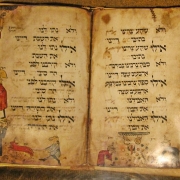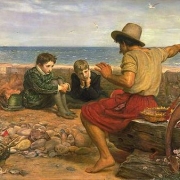I remember a much-loved literature professor impressing upon us the importance of story. ‘Why does it matter?’ he asked. ‘Because that’s what we are. You’re more than a personality; you’re more than your DNA. You’re a story, and your story is unique. Even if you and your identical twin did exactly the same things side by side for the rest of your lives, your stories would be different.’
And now we’re heading fast into Holy Week, a time in the Church year when we re-tell, and on a certain level re-live, the story most central to our identity as a faith community. And while that story is unifying, an arc big enough and transcendent enough to embrace us all, it enmeshes with our own stories to become something new and intimate. Each person’s journey towards resurrection is both like everyone else’s and very much unlike everyone else’s.
This early Easter story tells of two troubled young people and ‘the long journey we each take to go beyond what hurts toward the one who heals us’, while The Stories that Bind Us focuses on the communal story, pointing to the importance of a strong family narrative for children’s emotional health and resilience, and blogger Ellen Painter Dollar reflects on the dominant narratives surrounding disability as well as those stories it seems we’re not allowed to share.
The American radio programme, On Being, has also been talking about stories and story-telling lately. The episode entitled The Great Cauldron of Story, an interview with Harvard professor of Germanic languages and literature Maria Tatar, touches on the importance of fairy tales and legends (which she is careful to distinguish from sacred stories) in the working of our own personal narratives:
And at one point, I asked many of my students, what books from childhood they had brought with them to Harvard. And why? And what I was struck by was that often the students didn’t really remember much about the story, but there was something in the story — some little talisman. Some moment, a sentence, something a character does, a detail in a picture sometimes that they bonded with. It was almost like a little souvenir of the tale that they then carried with them into adult life. And you know, when they would think of that — everything with light.
We talked about brain sliding up that there was, and some deep connection with your childhood. And trying to figure that out was always such an interesting exercise. Because inevitably a story grew out of that souvenir. Not necessarily the story from childhood, but a new tale — their own story. And so, you know, again it became a kind of platform for figuring things out in their own lives — in their own daily lives.
Finally (I’ve saved the best for last), this interview with storyteller Kevin Kling gives me so much to think about when it comes to stories and healing that even though I’m going to put in a few excerpts here, I urge you to listen to the whole programme some time when you’re in the car, or washing the dishes, or anything that allows you to pay whole-hearted attention to the funny, gentle wisdom found in this man’s stories and reflections. If you’d rather, you can read the transcript instead.
Kling was born with a birth defect and later survived a near-fatal motorcycle accident. I love his initial exasperation with fairy tales and how he came to see them:

And the Ugly Duckling, OK, this one, this one was a particular thorn for me. Um, because, I mean, the Ugly Duckling, it’s all going great, you know, when he’s this large uber-duck. I love that, you know, this big duck. But then they find out he’s a swan. And so he, he, all of a sudden, he’s not a duck anymore. He’s a swan. Well, when you’re a kid with a disability, what does that do, hope, you know, hope a ship of aliens lands and goes, “No, you’re really one of us?” Because, you know, but you’re stuck living with ducks…And yet when I learned you could tell them the way you saw them through your own eyes, and that fairy tales were meant to be told, and told at, to get your point of view across, then I got to change them around and thicken them up.
And elsewhere:
But that’s exactly how I use stories, is that by telling a story, things don’t control me anymore. It’s in my vernacular. It’s the way I see the world. And I think that’s why our stories ask our questions, our big questions, like, “Where do we come from before life, after life?” “What’s funny in this world, or sacred?” And even more importantly, by the asking in front of people, and with people, even if we don’t find the answer, by the asking, we know we’re not alone. And I have found that often that’s even more important than the answer.
But I want to end with another resurrection story. This is Kling describing his experience after the accident when he was suffering from post-traumatic stress, and how he remembers re-awakening to life.
And I had to take an elevator down to the bottom floor every day and try to walk a half a block. That was, like, my job. And I’d walked my half a block, and my wife, Mary, met me in the lobby, and she bought an apple for me. And I hadn’t, food had no taste. So I was losing a lot of weight. And she said, “Just take a bite just for me.” So I took a bite, and flavor, that was the day it came back, and the sweetness came in, and, um, when the sweetness hit my tongue, it, I started to cry and it was flushing out all of the antibiotics and toxins that I had. I had not, again, I hadn’t cried in years. And my eyes were burning, and with my burning eyes and the sweetness in my mouth, it just felt good to be alive.





